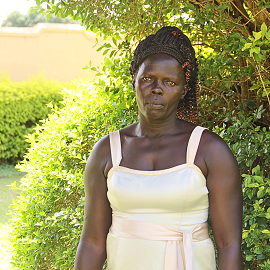Land grabbing and forced evictions are characterized of gross abuse and violation of human rights. In Uganda, land eviction is systematic with many communities being forcefully evicted from their land by state agencies such as the National Forestry Authority (NFA), Uganda Wildlife Authority (UWA), private investors and unscrupulous individuals.
Recently, we trained community members from Kiryandongo district who are facing extensive land grabbing which has destabilized their community causing a lot of suffering and rendering many homeless and landless.
According to the 2022 Land Rights report termed; ‘Kiryandongo 2022 brief note’, it indicated that, in 2017 alone, more than 30,000 families occupying over 9500 acres of land in Kiryandongo district were evicted from their lands on which they have been living for centuries.
 Babra Aciro, a 43-year-old mother of seven (7), a resident of kisura in kiryandongo district lost her land to Kahinde, a land grabber with the support of the L.C.1 Chairperson, Bosco Behemuka.
Babra Aciro, a 43-year-old mother of seven (7), a resident of kisura in kiryandongo district lost her land to Kahinde, a land grabber with the support of the L.C.1 Chairperson, Bosco Behemuka.
“He fenced off my land and planted trees on it. When I complained to the office of the L.C.1, he said that there was not anything he could do to stop Kahinde but instead I should leave my land and find some other place to go.” Babra explained.
It should be noted that Kahinde did not only deprive Babra of using her land, but he also threatened Babra’s life and assaulted her. He equally made it clear that no one would ever dare him to try to protect Babra because of the power and connections he possesses.
“When I filed a complaint to L.C.1, my situation worsened. Kahinde retaliated by demolishing my kitchen, assaulted me and issued threats to my life right before my children. When I logged another complaint at the police, the same Kahinde demolished my toilet,” Babra explains.
Just like the political system, the judicial system has been corrupted leaving vulnerable communities and individuals like Barbra with no place to seek justice. Unfortunately, lack of knowledge and information regarding their rights and freedoms and how they can fight back makes the situation even more difficult and exposes them to abusive actors.
Although Babra had made several attempts to the local authorities seeking for alternative solutions for her struggles, Kahinde was powerful, he had infiltrated the entire system including institution of police whose duty is to preserve law and order in the society hence rendering Babra helpless and hopeless.
Babra’s resilience to fight for what rightfully belongs to her deteriorated by day as her friends asked her to sell her land for the sake of her life and that of her children.
“When I agreed to sell the land and started to search for the buyer, the L.C.1 expressed interest in buying it which I agreed to. To my surprise, after he bought my land, I signed the agreement, but the L.C.1 refused to sign on his part claiming that all was well since he himself was the buyer.”
“Without my knowledge, L.C.1 informed Kahinde that I was selling my land. He picked money from Kahinde and pretended to be the buyer of my land, yet he was buying it for Kahinde, the same man who had tormented me over my land and this depressed me even more.” Babra stressed.
As a matter of fact, our lack of knowledge is to blame for the suffering of most vulnerable communities in Kiryandongo district, George Okiidi one of the participants in our recently concluded training notes. “There are people like Musa who is not in any committee of the local council or even in the district, yet he uses those authorities to grab people’s land simply because of people’s ignorance.”
Babra and other community members have been trained with skills on how to incorporate nonviolent resistance in their efforts to wage against land injustice and other forms of injustice in their communities. Babra and other members are grateful for the opportunity to be trained.
“While in the training, I realized that I was not alone facing land injustice. But this training has taught us many ways on how to protect our land and how to deal with land grabbers.” Babra joyously explained.
George too is grateful for taking part in the training which he believes will benefit his community in Mutunda. “I want to appreciate the facilitators of this training, for coming to Mutunda subcounty to assess the magnitude of land grabbing here and taking an initiative to train us, this has opened our eyes to know how to deal with land grabs.”
Land remains a key symbol of identity for majority of the people in Uganda, yet land grabs perpetrated by rich and powerful individuals, state and non-state actors continue to increase. We continue to empower grassroots communities through training and coaching to enable them to incorporate non-violent resistance in their efforts to wage against land injustices. We mentor them into building strong and impactful campaigns that will allow them to actively use creative means to find solutions to their problems.


